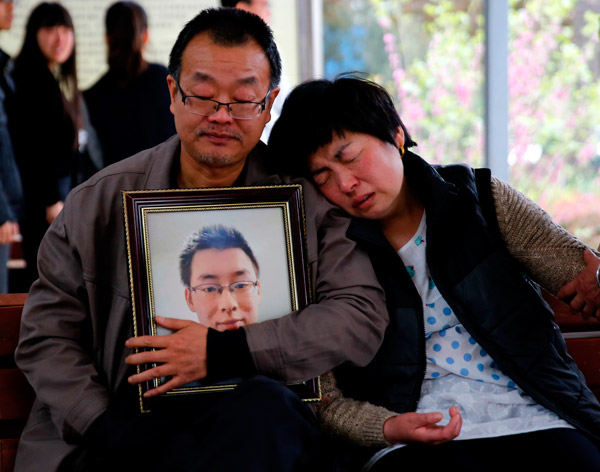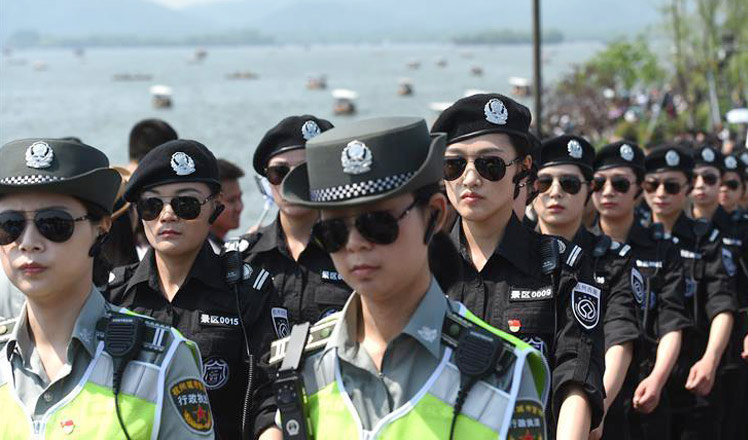Baidu faces probe after outcry over cancer treatment
Updated: 2016-05-03 03:03
By Shan Juan(China Daily)
|
||||||||
 |
|
The parents of Wei Zexi, a computer science major at Xidian University in Shaanxi province who died of a rare form of cancer, wait outside a funeral home in Xianyang, Shaanxi, on April 13. WAN JIA / FOR CHINA DAILY |
The central government has set up an investigation team to probe search engine giant Baidu, after the company was accused by a hospital patient, who since has died, of providing misleading medical treatment information.
The team is made up of officials from the Cyberspace Administration of China, the National Health and Family Planning Commission and the State Administration for Industry and Commerce — the regulator of online advertisement.
Jiang Jun, spokesman for the CAC, which is the country's internet regulator, said the results of the investigation will be made public.
Nasdaq-listed Baidu has been under mounting public pressure since a couple said online that their 21-year-old son died of cancer after receiving immunotherapy at a hospital in Beijing.
Baidu shares had dropped by 6.8 percent in New York trading as of press time.
Wei Zexi, a computer science major at Xidian University in Shaanxi province, died from synovial sarcoma, a rare cancer of the soft tissue, on April 12. Four times since September, he had received a treatment that uses cells generated by a patient's own immune system to kill cancer cells.
The treatment was administered at the biological treatment center of the Second Hospital of the Beijing Armed Police Corps.
The parents said their son learned of the treatment and the hospital by researching the disease on Baidu, and that the hospital was listed second from the top on the first page of search results.
Before Wei's death, he also had posted about his experience on the Q&A website Zhihu, calling the treatment useless and criticizing Baidu's paid listing practice.
Paid listing is an internet advertising model used to direct traffic to websites. The system, under which an advertiser pays a search engine for each time an ad is clicked, has long been a major source of revenue for Baidu.
Compared with other search engines such as Google, which clearly marks search results that are advertisements with a color label, Baidu's paid listing results do not have clear labels.
Instead, they are marked by two small, gray characters denoting the listing as a paid promotion.
In a media statement, Wei's parents said: "We don't want any compensation, nor will we sue any organizations or individuals. While our son posted his experience online, his purpose was simple: just to let more people know the therapy is useless."
In Wei's posting, he said other public hospitals had told him his days could be numbered, since end stage cancer had been diagnosed in 2014. He said the immunotherapy treatment at the Beijing hospital cost the family more than 200,000 yuan ($31,000), most of which was borrowed from friends and relatives.
Wei had previously been treated with chemotherapy.
The young man's case stirred public wrath in the past few days over regulation of online advertising, with the debate focusing on whether Baidu should bear responsibility for the medical promotions it offers.
Baidu said in a statement on Sunday that it will fully cooperate with the government investigation and that false online information should not be allowed.
In an earlier reply on Sunday, Baidu had said it asked authorities to investigate the hospital's subcontracting of the controversial therapy.
Media reported on Monday that the biological treatment center at the hospital where Wei received the therapy was not part of the hospital but was subcontracted to a private company in violation of regulations.
A visit to the center on Monday found that its operations has been suspended.
The hospital declined to comment.
Ying Jianming, deputy director of the Pathology Department of the Cancer Institute and Hospital at the Chinese Academy of Medical Sciences, said the immunotherapy treatment in question is regulated as medical science research, and thus it must not be commercially marketed or practiced as regular therapy.
But in many military-affiliated hospitals such as the one Wei had been to, "it's not strictly regulated," he said, adding that in large public hospitals, "there are no such practices".
However, the possibility that such treatment might be helpful for some patients cannot be ruled out, Ying said.
A terminal synovial sarcoma patient can usually live for one month to one year with mainstream therapies like surgery and chemotherapy, he said.
This was not the first time that Baidu has been criticized for its commercial model. In November 2008, State-owned CCTV reported that Baidu sold priority placement for certain key medical terms to fake hospitals and unlicensed medicine suppliers.
Currently, there is no regulation of this practice.
Zhu Wei, an associate professor at China University of Political Science and Law, said a detailed regulation on internet advertisement should be issued as soon as possible.
"The paid listing is a kind of advertising and should be governed by law," he said.
The State Administration for Industry and Commerce made public a draft regulation on online advertising to solicit public opinion last summer, but no announcement has been made on its status.
Meng Jing and Cao Yin contributed to this story.
shanjuan@chinadaily.com.cn
- UN urges DPRK to stop 'further provocative action'
- China stresses Putin's expected visit
- British FM visits Cuba for 1st time since 1959
- Trump attacks Clinton on gender, risking backlash from women
- Pirate radio poses surprising challenge in internet age
- DPRK's Musudan missile launch appears to have failed

 Female patrol team seen at West Lake in Hangzhou
Female patrol team seen at West Lake in Hangzhou
 Drones monitoring traffic during May Day holiday
Drones monitoring traffic during May Day holiday
 Sino-Italian police patrols launched in Italy
Sino-Italian police patrols launched in Italy
 Met Gala: Fashion in an Age of Technology
Met Gala: Fashion in an Age of Technology
 Photos from around China in April
Photos from around China in April
 Top 10 luxury cars at the 14th Beijing auto show
Top 10 luxury cars at the 14th Beijing auto show
 European castle-style campus wows in Southwest China
European castle-style campus wows in Southwest China
 Industrial city reinvents itself as green oasis
Industrial city reinvents itself as green oasis
Most Viewed
Editor's Picks

|

|

|

|

|

|
Today's Top News
Liang avoids jail in shooting death
China's finance minister addresses ratings downgrade
Duke alumni visit Chinese Embassy
Marriott unlikely to top Anbang offer for Starwood: Observers
Chinese biopharma debuts on Nasdaq
What ends Jeb Bush's White House hopes
Investigation for Nicolas's campaign
Will US-ASEAN meeting be good for region?
US Weekly

|

|









